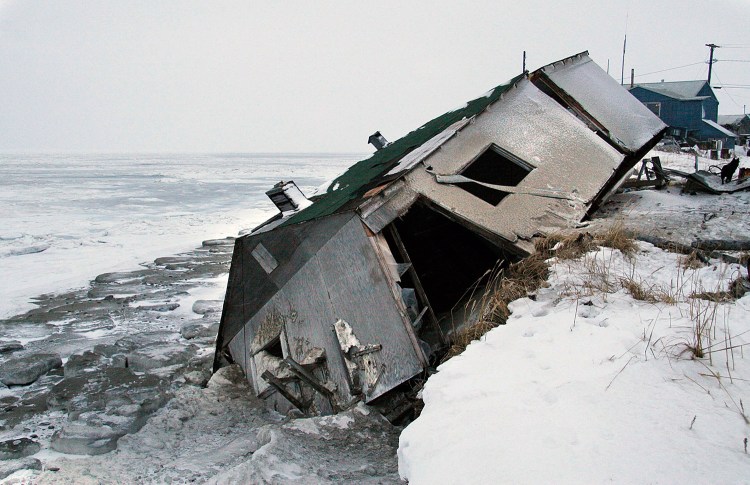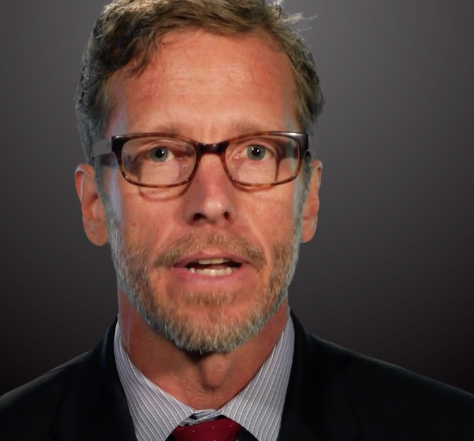A government scientist from Maine is drawing national attention for a very public whistle-blower complaint he has filed against the Trump administration.
Joel Clement, a 1984 graduate of Falmouth High School, until recently was the director of the Department of the Interior’s Office of Policy Analysis, where he examined the effects of climate change on native communities in Alaska. But in June he was reassigned to the accounting office, to a job collecting royalties from oil and gas companies. His move was part of a shakeup ordered by Interior Secretary Ryan Zinke that reassigned dozens of senior officials to jobs in which they had no background.
“I believe I was retaliated against for speaking out publicly about the dangers that climate change poses to Alaska Native communities,” Clement wrote in an op-ed published Wednesday in The Washington Post. “It is clear to me that the administration was so uncomfortable with this work, and my disclosures, that I was reassigned with the intent to coerce me into leaving the federal government.”
In an interview Thursday with the Press Herald, Clement said he decided to make his grievances public in the hopes of inspiring others to push back against the mass job reassignments. “People are really scared right now, and I hope by speaking out, others will do the same,” he said. “If they are coming after our jobs, we should make them fight for it.”
Clement filed a complaint Wednesday with the U.S. Office of the Special Counsel, asserting his reassignment violated federal whistle-blower protections. He noted that Zinke had recently testified before Congress that the department would use such reassignments in an effort to eliminate staff.
Other reassigned officials include the head of the Bureau of Indian Affairs and his deputy, and senior managers at the National Park Service and U.S. Fish and Wildlife, The Washington Post reported last month.
ALASKAN NATIVE VILLAGES UNDER THREAT
Clement has little doubt about why he was targeted. “My disclosures for the months prior to my reassignment were exclusively about climate change impacts,” he said from Washington. “And the issue isn’t that there are climate impacts, but that there are American lives at risk and the health and safety of Americans are under threat.”
More than 30 Alaska Native villages in the northwestern part of that state are in the midst of relocating because of thawing permafrost and storm damage and erosion exacerbated by the loss of protective sea ice in winter. Many are having difficulties funding the expensive moves to safer locations.
“They live on narrow spits of land vulnerable to wave activity in the absence of sea ice, and risk becoming refugees within America,” Clement said.
In his complaint to the Office of the Special Counsel, Clement noted that in the months since Trump’s election he had discussed his climate impact research at the White House and the United Nations, and at conferences in Alaska and Sweden. The Special Counsel is a permanent federal agency charged with protecting federal workers from retaliation for whistle-blowing – alerting the office or the public to violations of law and regulations, gross mismanagement, or abuse of power and endangering public health and safety. It has jurisdiction under federal law to seek corrective action or disciplinary action. It is entirely unrelated to Justice Department special counsel Robert Mueller’s office, which is investigating ties and possible collusion between the Trump campaign and Russian officials.
GREW UP IN FALMOUTH, DEEP ROOTS IN MAINE
Clement said he grew up in Falmouth “a block away” from where his father was born and raised. He is a direct descendant of the famously stubborn Ebenezer Hall, the first European settler on Matinicus Island, who was killed by Penobscot warriors in 1757 after ignoring their pleas and the orders of Massachusetts officials to leave the tribe’s territory.
Clement attended the University of Virginia and did graduate studies in forest biology at The Evergreen State College in Olympia, Washington, according to his LinkedIn profile. He joined the Interior Department seven years ago after working on climate adaptation for the Wilburforce Foundation, a conservation group in Seattle.
“Born and raised in Maine, I was taught to work hard and speak truth to power,” Clement wrote in his editorial.
Clement expressed hope Thursday that the Office of the Special Counsel would compel Zinke to reverse himself. “I hope they determine quickly that the Department of the Interior made a mistake and will put me back to work serving the vulnerable Alaska Native communities,” he said.
Heather Swift, a spokeswoman for the Department of the Interior, said via email that the department does not comment on “ongoing matters such as whistle-blower complaints” and looked forward to working with the Special Counsel “to address any questions they might have about this matter.”
Swift defended the reassignments last month, telling The Washington Post they “are being conducted to better serve the taxpayer and the department’s operations through matching senior executive skill sets with mission and operational requirements.”
Colin Woodard can be contacted at:
cwoodard@pressherald.com
Copy the Story LinkSend questions/comments to the editors.




Success. Please wait for the page to reload. If the page does not reload within 5 seconds, please refresh the page.
Enter your email and password to access comments.
Hi, to comment on stories you must . This profile is in addition to your subscription and website login.
Already have a commenting profile? .
Invalid username/password.
Please check your email to confirm and complete your registration.
Only subscribers are eligible to post comments. Please subscribe or login first for digital access. Here’s why.
Use the form below to reset your password. When you've submitted your account email, we will send an email with a reset code.